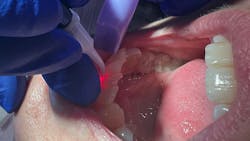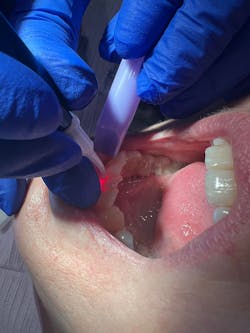How to take care of your dental laser: Troubleshooting tips from a dental hygienist
So, you now have a laser for your dental hygiene operatory. Dental lasers will last an exceptionally long time if they are cared for properly. There are several things you can do to ensure the longevity of your laser. Remember, this technology is an investment that must be cared for.
Protect your laser
The laser needs to be stored in a safe place, so it doesn’t get accidentally knocked off the counter. If the laser is left out, securing it will protect it.
Place your laser on a shelf that is not easily disturbed or on a cart where it can be secured. The cart should have drawers to store the foot pedal and tips, if needed, as well as laser safety glasses. This way you can easily move the laser between operatories.
Protect the foot pedal so that the cords won’t be run over with the operator chair. If your foot pedal cords are frayed, don’t repair them with black electrical tape; replace the foot pedal instead. Some foot pedals are corded, and others are cordless.
If you have a cordless foot pedal, you’ll need to replace the batteries to keep it working in top condition. It is good practice to replace the batteries every three months as opposed to waiting for them to run low. You want to avoid the batteries running low when you’re using the laser on a patient. Having to stop to replace batteries takes valuable time away from your patient.
Learn more about lasers … Your guide to using dental lasers in your hygiene practice
Protect the fiber
This is a little more of an issue if your laser has a spool fiber. The fiber spool is glass, and if the fiber is fractured or damaged in any way, it can’t be used.
Make sure the tools used for stripping and cleaving the fiber are in good working order. The stripping device should have blades sharp enough to remove the plastic surrounding the glass fiber. Make sure the cleaving stone, pen, or scissors are working correctly as well.
If you have a laser with tips that you must purchase and place on the end of the handle, and if you notice that the laser aiming beam no longer shines out of the tip, the laser fiber may be damaged. Evaluate it and replace if needed.
Be careful when cleaning the laser handle with chemicals. You want to be sure none of the chemicals gets into the opening; chemicals can destroy or damage the laser handle.
If your laser uses tips and the aiming light is no longer working, there’s a chance the handpiece has been damaged and should be sent back to the manufacturer.
Protect your eyes
Protect your eyes by wearing safety glasses that are not damaged or cracked and that are the correct wavelength for the laser you’re using. Never use a chemical to clean off the lenses of the safety glasses. Use warm, soapy water to clean them, and then dry with a soft cloth.
If you have used chemicals in the past and notice any part of the lenses appear flaky, it’s time to replace the safety glasses.
Protect your laser investment
Lasers have warranties that should be followed. Send your laser in as needed for maintenance. Follow the owner’s manual to make sure you are caring for the laser properly. The goal is to keep it in good working condition for years to come.
Author’s note: The Academy of Laser Dentistry is a good resource.
Read more about dental lasers …
So, you want to be a laser dental hygienist?
Which dental laser should I choose, and what can I use it for?
What type of training do dental hygienists need to use lasers?
What is the difference between LAPT and LBR?
Laser safety eyewear: It’s nonnegotiable
How do you find the best laser for your dental practice?
Laser procedures for dental hygienists: Herpetic lesions and desensitization
How dental hygienists can encourage greater use of lasers in the dental office
Communicating with your patients about dental lasers: What to say and how to say it
Communicating with your patients about dental lasers: What not to say
Communicating with your patients about dental lasers: Answering your patients’ questions
Editor’s note: This article first appeared in Through the Loupes newsletter, a publication of the Endeavor Business Media Dental Group. Read more articles and subscribe to Through the Loupes.
About the Author
Angie Wallace, RDH
Angie Wallace, RDH, has been a clinical hygienist for more than 35 years. She is a member of the Academy of Laser Dentistry (ALD), where she obtained her advanced level proficiency, educator status, Recognized Course Provider status, and mastership. Angie is the chair for education on the ALD Board of Directors and serves on both the Regulatory Affairs and Auxiliary committees. She has a laser education consulting company, Laser Hygiene, LLC, and has been recognized as a worldwide speaker. Contact her at [email protected].


